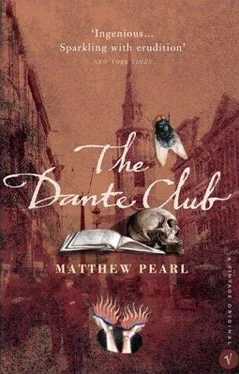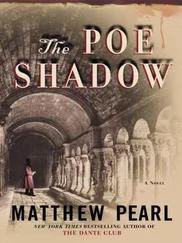Your absence from Nahant will leave a gap like that made in the street when a house is pulled down . Longfellow noticed how Dantesque his figures of speech had become.
Charles Eliot Norton and William Dean Howells had returned from Europe in time to assist Longfellow in annotating his complete translation. The halo of their foreign adventures still on them, Howells and Norton promised their friends tales of Ruskin, Carlyle, Tennyson, and Browning: There were certain chronicles better relayed in person than by letter.
Lowell interrupted this sentiment with a hearty laugh.
“But aren’t you interested, James?” asked Charles Eliot Norton.
“Our dear Norton,” Holmes said, glossing Lowell’s gaiety, “our dear Howells, it is we , though we have crossed no ocean, who had a voyage that could be contained in no mortal letter.” Then Lowell swore Norton and Howells to eternal confidence.
When the Dante Club had to end their meetings, when their work was done, Holmes thought Longfellow might become uneasy. So Holmes volunteered Norton’s Shady Hill estate to meet at on Saturday evenings. There they would discuss Norton’s progressing translation of Dante’s La Vita Nuova –”The New Life”—the story of Dante’s love for Beatrice. Some nights their little circle was enlarged by Edward Sheldon, who began compiling a concordance of Dante’s poems and minor writings, on his way, he hoped, to studying for a year or two in Italy.
Lowell had recently agreed to allow his daughter Mabel to travel to Italy as well, for a tour of six months. The Fieldses, who would depart by ship in the New Year to celebrate the passing of daily operations of the publishing firm to J. R. Osgood, would escort her.
In the meantime, Fields began arranging for a banquet at Boston’s famous Union Club even before Houghton started printing Longfellow’s Divine Comedy of Dante Alighieri , three volumes that reached the booksellers as the literary event of the season.
On the day of the banquet, Oliver Wendell Holmes spent the afternoon at Craigie House. George Washington Greene was in, too, from Rhode Island.
“Yes, yes,” Holmes said to Greene of the great numbers his second novel had sold. “It is the individual readers who matter most, for in their eyes reside the worth of writing. Writing is not survival of the fittest but survival of the survivors. What are the critics? They do their best to cheapen me, to make me of no account—and if I cannot endure it, I deserve it all.”
“You sound like Mr. Lowell these days,” Greene said, laughing.
“I suppose I do.”
With a shaky finger, Greene pulled his white cravat away from his baggy neck. “Just need some air, no doubt,” he said while falling into a burst of coughing.
“If I could make you well, Mr. Greene, I believe I would turn physician again.” Holmes went to see whether Longfellow might be ready.
“No, no, better not,” whispered Greene. “Let us wait outside until he’s finished.”
Halfway down the front path, Holmes remarked, “I supposed I should have had enough, but do you believe, Mr. Greene, that I have begun rereading Dante’s Comedy ? I wonder, through all we experienced, you never doubted the value of our work. You never once thought something had been lost along the way?”
Greene’s half-moon eyes closed. “You gentlemen. Dr. Holmes, always thought Dante’s story the greatest fiction ever told. But I, I had always believed Dante made his journey. I had believed God had granted him that, and had granted poetry that.”
“And now,” Holmes said. “You still believe it was all true, don’t you?”
“Oh, more than ever, Dr. Holmes.” He smiled, looking back at the window of Longfellow’s study. “More than ever.”
The lamps turned low in Craigie House, Longfellow climbed the stairs, passing the Giotto portrait of Dante, who looked unfazed by his one useless, damaged eye. Longfellow thought that perhaps this eye was the future, but in the other would remain the beautiful mystery of Beatrice that set his life in motion. Longfellow listened to the prayers of his daughters, then watched Alice Mary tuck in her two younger sisters, Edith and little Annie Allegra, and their dolls, who had been taken with colds.
“But when will you be home, Papa?”
“Quite late, Edith. You’ll all be asleep by then.”
“Will they ask you to speak? Who else will be there?” Annie Allegra asked. “Tell us who else.”
Longfellow brushed his beard with his hand. “Who have I said so far, my dear?”
“Not at all enough, Papa!” She removed her notebook from under the covers. “Mr. Lowell, Mr. Fields, Dr. Holmes, Mr. Norton, Mr. Howells…” Annie Allegra was preparing a book she called A Little Person’s Memories of Great People , which she planned to publish with Ticknor & Fields, and had decided to start with a report on the Dante banquet.
“Ah, yes,” Longfellow interrupted. “You may add to that Mr. Greene, your good friend Mr. Sheldon, and certainly Mr. Edwin Whipple, Fields’s fine magazine critic.”
Annie Allegra wrote as much as she could spell.
“I love you, my dear little girls,” Longfellow said as he kissed each soft forehead. “I love you because you are my daughters. And Mama’s daughters, and because she loved you. And loves you still.”
The bright patches of the daughters’ quilts expanded and dropped sym-phonically, and there he left them, secure in the infinite hush of the night. He looked out the window to the carriage house, where Fields’s new carriage—it seemed he always had a new one—waited, the old bay horse, a veteran of the Union cavalry newly adopted by Fields, helping himself to water that had collected in a shallow ditch.
It was raining now, a night rain; a gentle, Christian rain. It must have been very inconvenient for J. T. Fields, driving from Boston to Cambridge only to go back to Boston again, but he had insisted.
Holmes and Greene had left a good space for Longfellow between them, on the seats across from Fields and Lowell. Longfellow, as he climbed up, hoped he would not be asked to speak in front of all the guests during the banquet, but if he were, he would thank his friends for bringing him along.
This project has its origins in academic research providentially guided by Lino Fertile, Nick Lolordo, and Harvard’s Department of English and American Literature. Tom Teicholz first challenged me to explore this unique moment in literary history further by constructing a fictional narrative.
The Dante Club ’ s evolution from manuscript to novel depended most of all on two talented and inspirational professionals: my agent, Suzanne Gluck, whose extraordinary commitment, vision, and friendship quickly became as integral to the book as its characters; and my editor, Jon Karp, who immersed himself wholly in shaping and guiding the novel with patience, generosity, and respect.
In between origin and completion, there are many who contributed and are owed thanks. For their faith and ingenuity as readers and advisers: Julia Green, beside me without fail for every new idea and obstacle; Scott Weinger; my parents, Susan and Warren Pearl, and brother, Ian, for finding time and energy to help with all dimensions. Further thanks to readers Toby Ast, Peter Hawkins, Richard Hurowitz, Gene Koo, Julie Park, Cynthia Posil-lico, Lino, and Tom; and to counselors on various issues Lincoln Caplan, Leslie Falls, Micah Green, David Korzenik, and Keith Poliakoff. Thanks to Ann Godoff for staunch support; also at Random House, my appreciation to Janet Cooke, Todd Doughty, Janelle Duryea, Jake Greenberg, Ivan Held, Carole Lowenstein, Maria Massey, Libby McGuire, Tom Perry, Allison Saltz-man, Carol Schneider, Evan Stone, and Veronica Windholz; David Ebershoff at Modern Library; Richard Abate, Ron Bernstein, Margaret Halton, Karen Kenyon, Betsy Robbins, and Caroline Sparrow at ICM; Karen Gerwin and Emily Nurkin at William Morris; and to Courtney Hodell, who fortified the project with zeal and her inventive perspective.
Читать дальше












